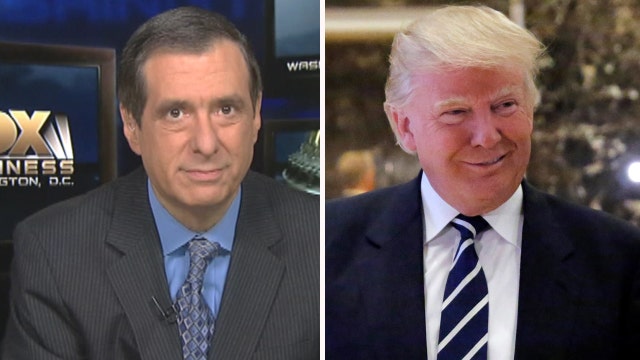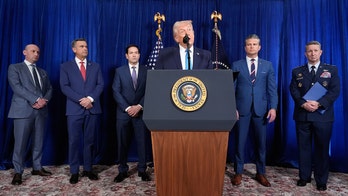Kurtz: Hyperbole over federal unit becoming 'Trump TV'
'MediaBuzz' host Howard Kurtz weighs in on the media hyperbole surrounding the congressional amendment to abolish the Broadcasting Board of Governors
The headlines sound downright scary.
Donald Trump could be getting “an unfettered propaganda arm.” He might finally have his own “Trump TV.” He could install a right-wing ideologue at taxpayer expense.
Pretty chilling stuff -- except for the fact that the media operation in question is backed by the Obama administration and the top Democrat on the House Foreign Affairs Committee.
The episode provides a stark example of the media’s double standard when it comes to Trump, in which something barely treated as news mushrooms into a calamity because he, rather than Hillary Clinton, will be sitting in the Oval Office.
The focus of this heated coverage is a congressional amendment to abolish the Broadcasting Board of Governors, which oversees the Voice of America, Radio Free Europe/Radio Liberty and other government communications agencies.
In the wake of a bipartisan consensus that the board is ineffective and sometimes incompetent, Congress recently voted to replace it with a single chief executive now appointed by the president. Obama is expected to sign a defense authorization bill that includes the amendment as early as today.
Ed Royce, the California Republican who chairs the Foreign Affairs panel, dismissed what he called the media “spin.” In an interview, he told me: “It’s hysteria. It’s a smokescreen that some have put up. This has nothing to do with the incoming president of the United States. This has nothing to do with Donald Trump.”
Royce announced the legislation last year with support from the committee’s top Democrat, Eliot Engel of New York, who said he was “proud” to join the effort to “to breathe new life into American international broadcasting by modernizing and streamlining the BBG.” They had proposed a similar measure in 2014.
President Obama’s handpicked chairman of the governors’ board, Jeff Shell, who is also an NBC film executive, agreed the changes were long overdue. And no one much cared. Clinton has also criticized the board of governors.
But now that Trump will be appointing the chief executive, Politico quoted an unnamed government official as warning that eliminating the board “will make it susceptible to the influence of Trump’s allies, including Steve Bannon, who ran Breitbart News.” It was Politico that said this could turn into “Trump TV,” a “propaganda arm” of the White House.
A Washington Post editorial said the new president “will be able to install the editor of Breitbart News or another propagandist of his choice to direct how the United States is presented to the world.” There is only the “hope” that Trump picks someone committed to independent journalism “rather than a political loyalist or alt-right ideologue,” the paper said.
So a legislative change that would have been unremarkable in a Hillary Clinton administration has become, for some in the media, a story about Breitbart and the alt-right.
Royce said in the interview that the programs “have been crippled, and part of that is the bureaucracy. This hasn’t been a partisan issue.”
Noting that any Trump appointee would be subject to Senate confirmation, the congressman said the recent media warnings “have zero grounding in fact. I’ll never allow the BBG to be transformed into some kind of White House propaganda machine, nor will Congress. The American people won’t stand for it.”
Under a three-year-old legislative change, the agencies' content can also be broadcast in the United States.
The VOA and related agencies, with an $800-million budget, were designed to provide an independent source of news to closed societies and dictatorships, and pride themselves on their journalistic independence. The effort has taken on new importance in an era of ISIS propaganda and Russian cyberhacking.
The nine-member board was originally created as a political buffer. Among the problems is that its members serve part time and meet once a month, with action often delayed if they can’t obtain a quorum.
Royce said, for instance, that it took the board six months to produce one 30-minute Russian-language program, at a cost of $2.5 million, after Vladimir Putin’s invasion of Ukraine, “and the viewership was abysmal.” He also noted that the VOA has stopped broadcasting in Arabic to the Middle East.
Even Clinton, as secretary of State, said in 2013 that “our Broadcasting Board of Governors is practically defunct in terms of its capacity to tell a message around the world. So we’re abdicating the ideological arena and we need to get back into it.”
Engel said today that he supports having the agencies producing “high-quality, unbiased news and information for audiences abroad,” not propaganda, and that “Chairman Royce’s reforms will help move us toward that goal.”
VOA Director Amanda Bennett, a former editor of the Philadelphia Inquirer, told staffers that the legislation “makes no changes to the BBG’s statutory firewall,” which will ensure “the professional independence of our journalists and broadcasters.” Her email was provided to the BBC.
The Politico story noted some of the bipartisan support for the change, yet also says the move to consolidate the agencies under a single CEO “could pave the way for Trump-approved content created by the U.S. diplomacy arm, if he chooses to exploit the opportunity.”
But the same could be said for any president. Only Trump’s election transformed this into big news.

























